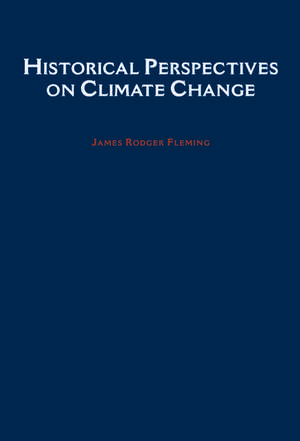Historical Perspectives on Climate Change
Autor James Rodger Flemingen Limba Engleză Paperback – 19 mai 2005
Preț: 220.38 lei
Nou
Puncte Express: 331
Preț estimativ în valută:
42.18€ • 43.66$ • 35.65£
42.18€ • 43.66$ • 35.65£
Carte tipărită la comandă
Livrare economică 22-28 februarie
Preluare comenzi: 021 569.72.76
Specificații
ISBN-13: 9780195189735
ISBN-10: 0195189736
Pagini: 208
Ilustrații: 11 line illus.
Dimensiuni: 234 x 156 x 11 mm
Greutate: 0.3 kg
Editura: Oxford University Press
Colecția OUP USA
Locul publicării:New York, United States
ISBN-10: 0195189736
Pagini: 208
Ilustrații: 11 line illus.
Dimensiuni: 234 x 156 x 11 mm
Greutate: 0.3 kg
Editura: Oxford University Press
Colecția OUP USA
Locul publicării:New York, United States
Recenzii
The debate over global warming is far from new; in fact, science historian James Fleming has just published a scholarly treatise on the historical debate over global warming entitled Historical Perspectives on Climate Change. I would highly recommend this interesting book for an accurate account of who did what first and who proposed which hypotheses. These things have been muddled in recent literature because very few researchers have taken the time to go back to the original resources.
I have read the book with great interest. It is a clear and scholarly exposition of a topic which is not well understood. The book places the current debates over global warming and other fears about climate change in their historical context.
Fleming has studied the history of science and of weather, and in his book, 'Historical Perspectives on Climate Change,' published in September by Oxford University Press, he discusses the human understanding and response to the Earth's changing climate. 'Our understanding of climate dynamically changes as fast or faster than the climate itself,' he said. The book looks at weather in America beginning in 1720 and ending in 1988, the start of what he calls the 'new era of global warming,' and discusses humans' reaction to the climate around them. During the colonial period, for instance, the Europeans who came to America viewed this as a cold continent. They believed that cutting trees and clearing swamps would warm it up. Nineteenth-century climatologists claimed this view of the Earth's climate was wrong, and the discovery that there had been Ice Ages in the planet's past fueled a move toward a global view of temperature and climate.
While other recent books on climate change have focused on current theory and potential impact, Fleming has studied and written on the history of the concepts
A lucid, well-written, and skillfully presented work; the bibliography is bountiful and sources of information are well-documented. . . . General readers; faculty.
A series of interrelated essays on elite and popular understanding of climate and climate change offers historical perspectives dating from the period of Enlightenment to the late 20th century.
I have read the book with great interest. It is a clear and scholarly exposition of a topic which is not well understood. The book places the current debates over global warming and other fears about climate change in their historical context.
Fleming has studied the history of science and of weather, and in his book, 'Historical Perspectives on Climate Change,' published in September by Oxford University Press, he discusses the human understanding and response to the Earth's changing climate. 'Our understanding of climate dynamically changes as fast or faster than the climate itself,' he said. The book looks at weather in America beginning in 1720 and ending in 1988, the start of what he calls the 'new era of global warming,' and discusses humans' reaction to the climate around them. During the colonial period, for instance, the Europeans who came to America viewed this as a cold continent. They believed that cutting trees and clearing swamps would warm it up. Nineteenth-century climatologists claimed this view of the Earth's climate was wrong, and the discovery that there had been Ice Ages in the planet's past fueled a move toward a global view of temperature and climate.
While other recent books on climate change have focused on current theory and potential impact, Fleming has studied and written on the history of the concepts
A lucid, well-written, and skillfully presented work; the bibliography is bountiful and sources of information are well-documented. . . . General readers; faculty.
A series of interrelated essays on elite and popular understanding of climate and climate change offers historical perspectives dating from the period of Enlightenment to the late 20th century.
Notă biografică
James Rodger Fleming is Professor in the Science, Thechnology, and Society Program at Colby College.














